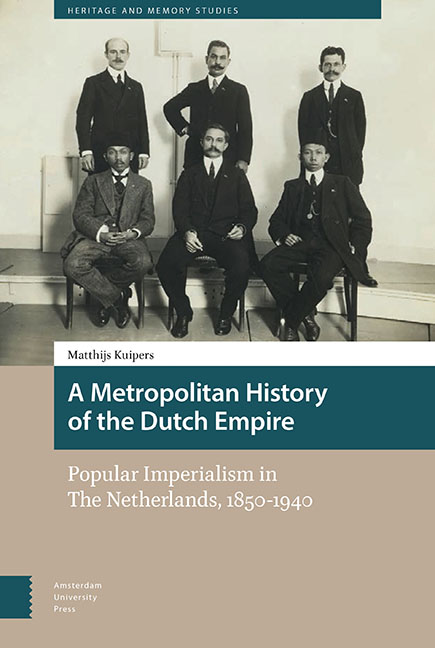Book contents
- Frontmatter
- Contents
- List of Figures and Tables
- List of Abbreviations
- On Names and Terminology
- Introduction: The Still Waters of Empire Run Deep
- 1 Food and Indifference: A Cultural History of the Rijsttafel in the Netherlands
- 2 Indonesians and Cultural Citizenship: The Metropolitan Microcosm of Empire
- 3 Schools and Propaganda: History Books and Schools as Sites of Imperial Campaigns
- 4 Scouting and the Racialized Other: Imperial Tropes in the Dutch Scouting Movement
- 5 Missionary Organizations and the Metropolitan Public: The ‘Inner Mission’ and the Invention of Mission Festivals
- Conclusion: A Fragmented Empire
- Sources
- Index
3 - Schools and Propaganda: History Books and Schools as Sites of Imperial Campaigns
Published online by Cambridge University Press: 06 May 2022
- Frontmatter
- Contents
- List of Figures and Tables
- List of Abbreviations
- On Names and Terminology
- Introduction: The Still Waters of Empire Run Deep
- 1 Food and Indifference: A Cultural History of the Rijsttafel in the Netherlands
- 2 Indonesians and Cultural Citizenship: The Metropolitan Microcosm of Empire
- 3 Schools and Propaganda: History Books and Schools as Sites of Imperial Campaigns
- 4 Scouting and the Racialized Other: Imperial Tropes in the Dutch Scouting Movement
- 5 Missionary Organizations and the Metropolitan Public: The ‘Inner Mission’ and the Invention of Mission Festivals
- Conclusion: A Fragmented Empire
- Sources
- Index
Summary
Abstract
This chapter examines the school curriculum as a channel of imperial propaganda. It centres on what Bernard Porter identified (in his exchange on popular imperialism with John MacKenzie) as the problem of writing propaganda history. A huge amount of imperial propaganda may imply that it must have had some success, or, alternatively, it may indicate that the propaganda was unsuccessful, and that hence so much of it was employed. Here, I argue that the case of Dutch schools and imperial propaganda veers towards the latter option: the narrative of imperial history in textbooks was uninspired, and private initiatives (like the so-called classroom collections, or schoolverzamelingen) had some reach but ultimately became dust catchers in school attics. Thus, imperial propaganda in Dutch schools struck a delicate balance: there was enough of it to install a latent imperial mindset in children, which could later be activated if they opted for an imperial career, but all the same its relative unassuming position within the curriculum meant that ideological notions of hierarchy between metropole and colony were respected.
Keywords: imperial propaganda, maps, school curriculum, Koloniaal Museum, textbooks
This chapter revolves around the problem of the reception of imperial propaganda, as identified by Bernard Porter in his critique on John Mac- Kenzie's work. That problem, which was already briefly mentioned in the introduction, is that there are two possible readings. The existence of abundant propaganda could mean that it was overwhelming, and therefore successful, or it could mean that it was not so successful, which would be the reason why ‘propagandists felt they needed to propagandize so hard’ in the first place. This chapter takes this problematique to Dutch schools. They were on the receiving end of significant promotional efforts regarding the empire, but the evidence also suggests that the reception was, at the very best, lukewarm. That makes the Dutch school system a good test case on how to interpret the histories of imperial propaganda. What campaigns were unloaded on schools, and how did this translate into classroom practice?
A first observation is that Dutch schools at the turn of the twentieth century had never been the stage of heated debates regarding the colonies.
- Type
- Chapter
- Information
- A Metropolitan History of the Dutch EmpirePopular Imperialism in the Netherlands, 1850-1940, pp. 117 - 144Publisher: Amsterdam University PressPrint publication year: 2022

